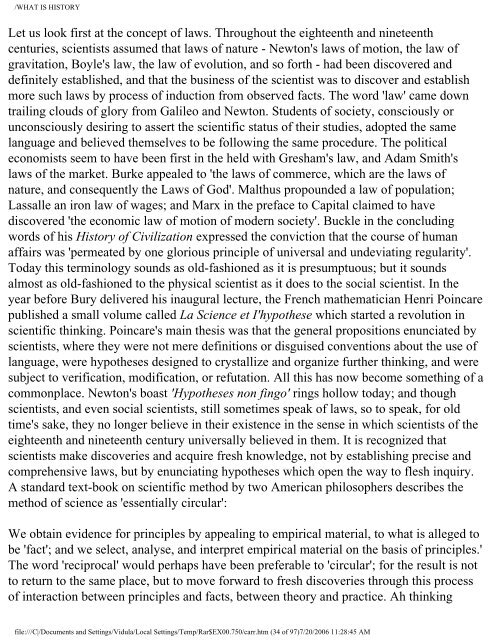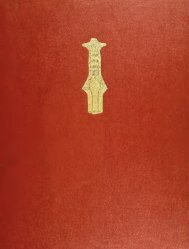What is History / by Edward Hallett Carr - Universal History Library
What is History / by Edward Hallett Carr - Universal History Library
What is History / by Edward Hallett Carr - Universal History Library
You also want an ePaper? Increase the reach of your titles
YUMPU automatically turns print PDFs into web optimized ePapers that Google loves.
WHAT IS HISTORY<br />
Let us look first at the concept of laws. Throughout the eighteenth and nineteenth<br />
centuries, scient<strong>is</strong>ts assumed that laws of nature - Newton's laws of motion, the law of<br />
gravitation, Boyle's law, the law of evolution, and so forth - had been d<strong>is</strong>covered and<br />
definitely establ<strong>is</strong>hed, and that the business of the scient<strong>is</strong>t was to d<strong>is</strong>cover and establ<strong>is</strong>h<br />
more such laws <strong>by</strong> process of induction from observed facts. The word 'law' came down<br />
trailing clouds of glory from Galileo and Newton. Students of society, consciously or<br />
unconsciously desiring to assert the scientific status of their studies, adopted the same<br />
language and believed themselves to be following the same procedure. The political<br />
econom<strong>is</strong>ts seem to have been first in the held with Gresham's law, and Adam Smith's<br />
laws of the market. Burke appealed to 'the laws of commerce, which are the laws of<br />
nature, and consequently the Laws of God'. Malthus propounded a law of population;<br />
Lassalle an iron law of wages; and Marx in the preface to Capital claimed to have<br />
d<strong>is</strong>covered 'the economic law of motion of modern society'. Buckle in the concluding<br />
words of h<strong>is</strong> H<strong>is</strong>tory of Civilization expressed the conviction that the course of human<br />
affairs was 'permeated <strong>by</strong> one glorious principle of universal and undeviating regularity'.<br />
Today th<strong>is</strong> terminology sounds as old-fashioned as it <strong>is</strong> presumptuous; but it sounds<br />
almost as old-fashioned to the physical scient<strong>is</strong>t as it does to the social scient<strong>is</strong>t. In the<br />
year before Bury delivered h<strong>is</strong> inaugural lecture, the French mathematician Henri Poincare<br />
publ<strong>is</strong>hed a small volume called La Science et I'hypothese which started a revolution in<br />
scientific thinking. Poincare's main thes<strong>is</strong> was that the general propositions enunciated <strong>by</strong><br />
scient<strong>is</strong>ts, where they were not mere definitions or d<strong>is</strong>gu<strong>is</strong>ed conventions about the use of<br />
language, were hypotheses designed to crystallize and organize further thinking, and were<br />
subject to verification, modification, or refutation. All th<strong>is</strong> has now become something of a<br />
commonplace. Newton's boast 'Hypotheses non fingo' rings hollow today; and though<br />
scient<strong>is</strong>ts, and even social scient<strong>is</strong>ts, still sometimes speak of laws, so to speak, for old<br />
time's sake, they no longer believe in their ex<strong>is</strong>tence in the sense in which scient<strong>is</strong>ts of the<br />
eighteenth and nineteenth century universally believed in them. It <strong>is</strong> recognized that<br />
scient<strong>is</strong>ts make d<strong>is</strong>coveries and acquire fresh knowledge, not <strong>by</strong> establ<strong>is</strong>hing prec<strong>is</strong>e and<br />
comprehensive laws, but <strong>by</strong> enunciating hypotheses which open the way to flesh inquiry.<br />
A standard text-book on scientific method <strong>by</strong> two American philosophers describes the<br />
method of science as 'essentially circular':<br />
We obtain evidence for principles <strong>by</strong> appealing to empirical material, to what <strong>is</strong> alleged to<br />
be 'fact'; and we select, analyse, and interpret empirical material on the bas<strong>is</strong> of principles.'<br />
The word 'reciprocal' would perhaps have been preferable to 'circular'; for the result <strong>is</strong> not<br />
to return to the same place, but to move forward to fresh d<strong>is</strong>coveries through th<strong>is</strong> process<br />
of interaction between principles and facts, between theory and practice. Ah thinking<br />
file:///C|/Documents and Settings/Vidula/Local Settings/Temp/Rar$EX00.750/carr.htm (34 of 97)7/20/2006 11:28:45 AM







